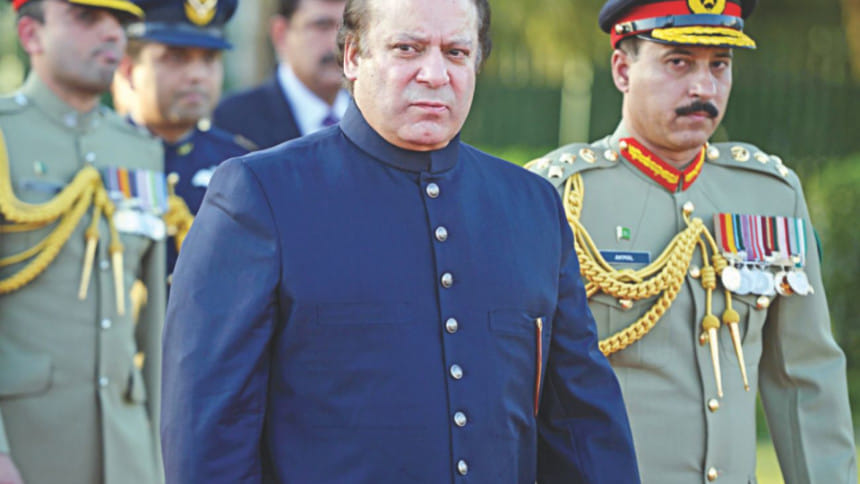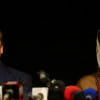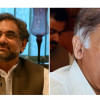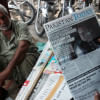Third time is not a charm

Nawaz Sharif had benefited immensely twice in the past by the rulings of the Pakistan Supreme Court. But last Friday's ruling delivered by the apex court not only caused his downfall, it also made his future in politics uncertain.
Nawaz's first term as the prime minister came to an abrupt halt as President Ghulam Ishaq Khan unilaterally dissolved the parliament in April 1993. He returned to power a month later after the SC ruled the presidential order to dissolve parliament unconstitutional.
A Supreme Court ruling again favoured him in 2007. After being deposed in a military coup in 1999, he along with his brother Shahbaz Sharif was exiled from the country.
But the SC in 2007 ruled that both Nawaz and his brother Shahbaz were free to return to Pakistan and he returned home and went back to politics.
He was also blessed by the constitutional amendment in 2010 that removed the limit on former prime ministers to hold office for only two terms, allowing Nawaz to run for office a third time.
He was elected as prime minister for third term in 2013 following his party PML-N's win in the election.
Nawaz became the first prime minister in the 70-years history of Pakistan to be elected thrice. But he could not complete even a single term. None of his predecessors was able to do so in the last seven decades.
He was first elected premier in November 1990. His government collapsed after the then president dissolved the parliament in April 1993. After he returned to power next month following the SC's verdict, Nawaz called a fresh election in August 1993 in which he faced defeat to Benazir Bhutto.
He became prime minister for the second term in 1997. But he continued to be at loggerheads with the judiciary, the president and also the chief of army. He forced President Farooq Leghari to resign and Chief Justice Sajjad Ali Shah was ousted.
But his conflict with the then army chief general Pervez Musharraf caused his downfall in October 1999. Musharraf grabbed power ousting Nawaz who was then exiled to Saudi Arabia.
In the past, he was able to make a comeback. But the way his third term as prime minister came to an end on Friday has put his future in Pakistani politics in uncertainty. A murky fate now awaits Nawaz and his two sons and a daughter.
In the unprecedented verdict, the SC found him guilty of concealing information about his assets abroad in his nomination paper submitted to the Election Commission seeking candidacy in the 2013 general election.
Soon after he was declared disqualified from holding the office of the premier and the membership in parliament, Nawaz resigned from the office.
INVESTIGATION TO CONTINUE
But this did not bring an end to the story as the judicial proceeding against Nawaz and his family members will continue.
The SC also ordered the anti graft body to file cases against Nawaz, his two sons and one daughter and to investigate the allegation of illegally amassing of the wealth which was revealed by reports leaked from the Panama-based law firm of Mossack Fonseca.
In Friday's verdict which is a continuation of the apex court's April verdict, the court ordered the anti-graft body, National Accountability Bureau to submit its report before the Accountability Court within six months from the date of the judgement.
In preparing and filing the cases, the anti graft body shall consider the material already collected during the course of investigation conducted earlier by the joint investigation team following the April verdict of the SC, the court said.
It said the Accountability Court shall take appropriate action against them if it finds any deed, document or affidavit filed by or on behalf of Nawaz, his family members or others to be fake, false, forged or fabricated.
The apex court also requested the chief justice of Pakistan to nominate a SC justice to supervise and monitor implementation of Friday's verdict in letter and spirit and oversee the proceedings conducted by the anti-graft body and the Accountability Court.
In view of Pakistan's journalist Zahid Hussain, the verdict is a serious blow to dynastic politics in Pakistan that has been the biggest impediment to the development of democratic institutions and values in the country.
"But such extreme action against the entire family and a consensus ruling came as a shock not only to the government but also to those outside," he said in a write up published in Dawn yesterday.
"There doesn't seem much chance of his return to power, but one is not sure if the family rule is over," he wrote.
The debate now is whether Nawaz's disqualification is permanent or temporary.
He however is trying to retain his influence in Pakistan's politics. He is still the chief of the PML-N, the party holding the majority seats in the parliament.
His younger brother, Shahbaz Sharif, is set to become the new prime minister. His party's dominance in other provinces in Pakistan was not disturbed by the apex court's verdict.
Nawaz Sharif was picked by Gen Zia's military government in the early 1980s as part of the plan to field him as an alternative leader to challenge Benazir Bhutto, daughter of Zulfikar Ali Bhutto.
In his rise, he enjoyed the backing of the military and the powerful civil establishment of Punjab. He was elected as chief minister of Punjab in 1985 and was re-elected after the end of martial law in 1988.
After the death of Gen Ziaul Haq in August 1988, the Pakistan Muslim League split into two factions, with Sharif taking charge of PML, which later came to be known as PML-N.
Over the years, he has consolidated his position in Pakistan politics. He and his family members have been accused of illegally amassing massive wealth in the name of family business. Finally, the Panama Papers where name of his family was mentioned caused his downfall.

 For all latest news, follow The Daily Star's Google News channel.
For all latest news, follow The Daily Star's Google News channel. 








Comments